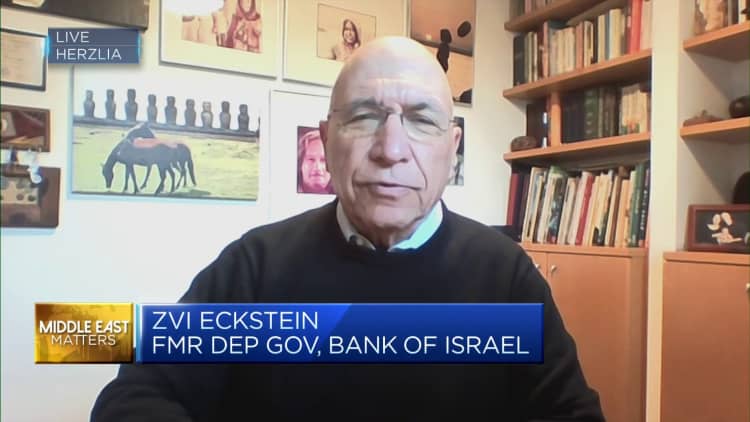
Israeli Prime Minister Benjamin Netanyahu speaks as he and Finance Minister Bezalel Smotrich hold a news conference to present their plan for dealing with price increases in Israel’s economy at the Prime Minister’s office in Jerusalem, January 11, 2023.
Ronen Zvulun | Reuters
Israel’s shekel is down nearly 6% in February and at its lowest against the dollar in three years, as political turmoil surges over controversial judicial reforms pushed by the right-wing government of Benjamin Netanyahu.
An estimated 160,000 protesters took to the streets of the capital Tel Aviv over the weekend, with tens of thousands more gathering in other cities, demonstrating against the governing coalition’s planned legal overhaul, which would significantly weaken Israel’s judiciary.
Signs carried by crowds of protesters read “No Constitution, No Democracy” and “They Shall Not Pass.” Members of Israel’s business, academic, legal and even military communities have warned against the changes.
Former Israeli Prime Minister Ehud Barak called the plans “an assassination of the Declaration of Independence, which will turn Israel into a dictatorship,” and described the current situation as “the worst crisis since the formation of the state.”
Thousands of Israeli protesters rally against Israeli Goverment’s judicial overhaul bills in the coastal city of Tel Aviv on February 25, 2023. Protesters confronted with police and blocked Ayalon highway.
Gili Yaari | Nurphoto | Nurphoto | Getty Images
Prime Minister Netanyahu has labeled the protests — which are now approaching their third month — an attempt “to create anarchy” and trigger another election. Israel, deeply divided, has had five snap elections since April 2019.
What are the proposed changes?
In short, the proposed judiciary overhaul will severely limit the Israeli Supreme Court’s ability to review and strike down laws that it deems unconstitutional. The Knesset — Israel’s parliament — voted last week to advance a major part of the reforms.
They essentially have four main clauses:
- Allowing the Knesset to override Supreme Court decisions with a simple majority of 61 out of 120 seats while, currently, the court can block any law it deems unconstitutional
- Removing the Supreme Court’s ability to judge Knesset legislation and other government decisions for “reasonability”; this principle was exercised in the court’s recent decision to rule one of Netanyahu’s ministerial appointments as “highly unreasonable” because of past criminal convictions
- Giving the most control over appointing judges to the ruling coalition, rather than to a current set committee of legal experts and representatives
- Allowing ministers to appoint their own legal advisors, and taking away the authority of the latter to make binding decisions
Netanyahu and his justice minister Yariv Levin say that the changes are needed to prevent the Supreme Court — which is unelected — from overly intervening in the cabinet and Knesset decision-making.
“The claim that this reform is the end of democracy is baseless,” Netanyahu has said in response to the torrent of criticism. The prime minister himself is currently under investigation on numerous counts of corruption and other charges, meaning he would likely benefit from a weaker judiciary.
He claimed that “the balance between the branches in the governmental system has been violated over the last two decades, and even more so in recent years,” and that the reforms would “restore the correct balance between the branches.”
But huge swathes of Israeli civil society, along with current and former lawmakers, strongly disagree.

“All functioning, healthy, and robust democracies have a clear separation of powers as well as checks and balances to ensure that no individual or institution should hold too much political power,” Yohanan Plesner, president of the Israel Democracy Institute, told CNBC.
“The main danger emanating from the planned judicial overhaul is that this package will [in] fact do just that – concentrate all political power in the hands of the executive branch, which already yields significant control over the Knesset, our legislative branch of government.”
Netanyahu says that enacting the changes is part of the mandate he won when he was elected to power again in November. But Avi Himi, head of the Israel Bar Association, said of the prime minster during a recent rally, “You never got a mandate to change the regime, you never got a mandate to destroy democracy. It’s our right to scream, it’s our obligation to scream, that’s how it is in a democracy.”
Economic impacts
The crisis is now extending to Israel’s economic future and has already hit equities and the national currency, with the Tel Aviv Stock Exchange’s benchmark TA-125 index down nearly 4% last week.
“While significant political premium now looks to be embedded in ILS (Israeli New Shekel), risks remain for the shekel over the short run,” Goldman Sachs wrote in a research note last Friday. “With the increase in market concerns surrounding the judicial reform, a simple benchmarking exercise suggests that roughly 8% risk premium has appeared to build in the shekel.”
People stage protest against Israeli Prime Minister Benjamin Netanyahu’s bill that restricts the powers of the judiciary and his right-wing policies at the Dizengoff Square in Tel Aviv, Israel on February 25, 2023.
Mostafa Alkharouf | Anadolu Agency | Getty Images
Zvi Eckstein, a former deputy governor of the Bank of Israel, explained the risk this could pose to the country’s crucial technology sector.
“Israel’s economy is very unusual — 17% of Israeli production, 11% of the labor force, are engaged in research and development activity in the high tech sector,” Eckstein said. “All of this is financed by venture capital that comes from abroad, almost 90% of this,” he said. The proposed judicial reforms now mean “huge uncertainty on the economy, huge uncertainty on local and foreign investment in Israel.”
Plesner at the Israel Democracy Institute agreed.
“Investors, and the global economy as a whole, seek not only stability, but often are drawn to countries with independent institutions such as the judiciary and a strong central bank,” he said.
Curtailing the independence of institutions “leads to a drop in foreign investment and a downgrading of their credit rating,” Plesner warned. “We can only hope that Israel’s leadership understands the risks it is imposing on the Israeli economy.”
